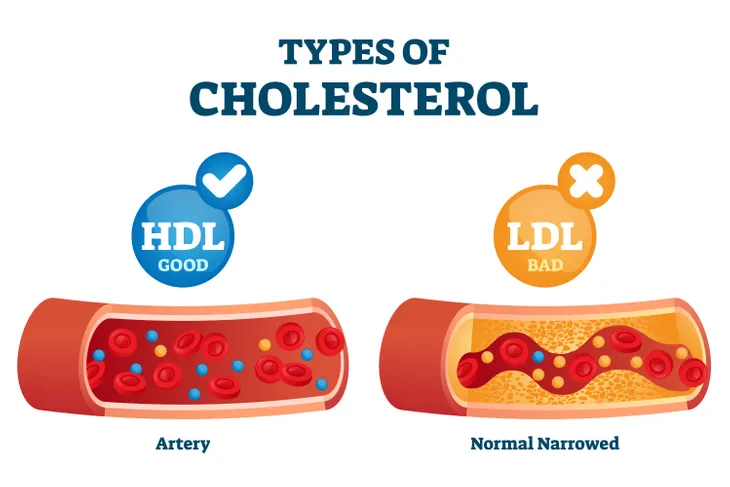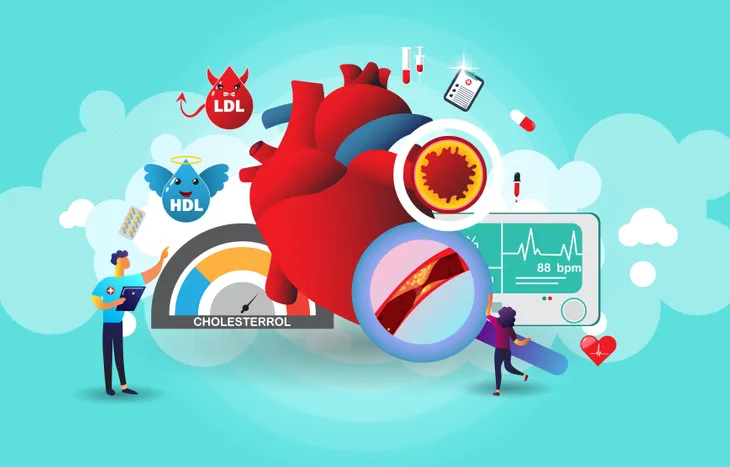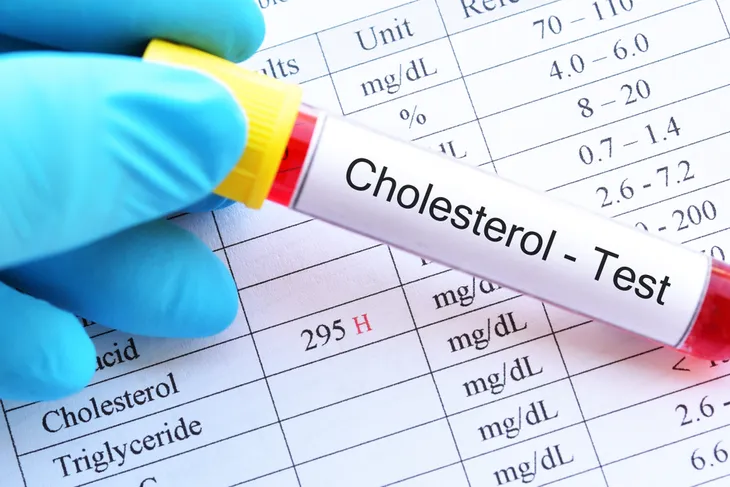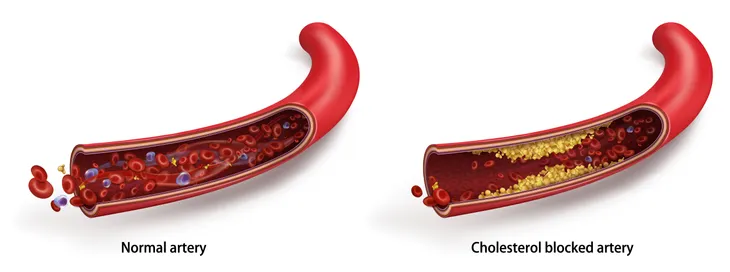You have likely heard about cholesterol but do you know exactly what it is and what it does? Healthline describes cholesterol as a waxy fat-like substance that moves through the body in your blood. Cholesterol is essential for the formation of hormones, cells, and vitamin D.
Your body naturally produces cholesterol but you can also get it from eating certain foods. While cholesterol is essential for everyone, having too much can cause serious health problems such as heart disease. This is why monitoring your cholesterol levels is important. In this article, we take a look at the different types of cholesterol, the normal cholesterol levels by age, and how to test your cholesterol.
Why Do We Need Cholesterol?
Cholesterol is important for everyone. Your body needs it to perform essential duties, such as making hormones, producing vitamin D, and building cells. It is also made and used by the liver to make bile, which helps your body digest food.
Cleveland Clinic explains that your liver makes enough cholesterol to meet your body’s needs. While cholesterol is essential, having too much can cause problems. High levels of cholesterol can lead to a condition called hypercholesterolemia and having levels too low can lead to a condition called hypocholesterolemia. Cholesterol levels that are too low are uncommon but it can happen.
What Are the Types of Cholesterol?
Cholesterol travels throughout your body and is carried by proteins in your blood called lipoproteins. The different types of lipoproteins are:
- Very low-density lipoproteins (VLDL) are particles in the blood that carry triglycerides (TG).
- Low-density lipoprotein (LDL) is one of the two main lipoproteins. It’s also often referred to as “bad cholesterol.”
- High-density lipoprotein (HDL) is the second main lipoprotein and is often referred to as “good cholesterol.”
Why You Need to Check Your Cholesterol Levels
Monitoring your cholesterol levels is important because high cholesterol is often a “silent” problem. Healthline explains that high cholesterol typically doesn’t cause any symptoms. In fact, most people don’t even know they have high cholesterol until they develop serious complications. It could lead to a stroke or heart attack.
Routine cholesterol screenings are important for preventing these complications. The American Heart Association recommends that adults age 20 and older have their cholesterol checked every four to six years as long as their risks remain low.
What Are Normal Cholesterol Levels for Teens and Children?
Certain risk factors can put a child at risk for having high cholesterol. This includes diabetes, obesity, or a family history of high cholesterol. In contrast, Healthline states that children who are physically active, eat a healthy diet, are not overweight, and don’t have a family history are at a lower risk. Here are the normal cholesterol levels for teens and children (age 19 and younger):
- Total cholesterol: less than 170 mg/dL (milligrams per deciliter)
- Non-HDL cholesterol: less than 120 mg/dL
- Triglycerides: (under 10 years of age) less than 75 mg/dL, (over 10 years of age) less than 90 mg/dL
- LDL cholesterol: less than 110 mg/dL
- HDL cholesterol: more than 45 mg/dL
Keep in mind, all children should have their cholesterol checked between the ages of 9 and 11 and then again at 17 and 21. That said, children who have risk factors for high cholesterol should have theirs checked at ages 2 and 8 and then again between ages 12 and 16.
What Are Normal Cholesterol Levels for Men
Just like children, certain risk factors, such as diet, genes, and exercise can alter cholesterol levels for men. Here are the normal cholesterol levels for men (age 20 and older):
- Total cholesterol: 125 to 200 mg/dL
- Non-HDL cholesterol: less than 130 mg/dL
- Triglycerides: less than 150 mg/dL
- LDL cholesterol: less than 100 mg/dL
- HDL cholesterol: 40 mg/dL or higher
What Are Normal Cholesterol Levels for Women
Women typically have lower cholesterol levels than men, until they reach menopause. After menopause, women’s LDL levels often rise and HDL levels drop. Here are the normal cholesterol levels for women (age 20 and older):
- Total cholesterol: 125 to 200 mg/dL
- Non-HDL cholesterol: less than 130 mg/dL
- Triglycerides: less than 150 mg/dL
- LDL cholesterol: less than 100 mg/dL
- HDL cholesterol: 50 mg/dL or higher
How to Measure Cholesterol Levels
To measure your cholesterol levels, your doctor will order a blood test. They may also order a lipid panel (also known as a lipid profile), which provides information on your total cholesterol, LDL levels, HDL levels, VLDL levels and TG, non-HDL cholesterol, and the ratio between cholesterol and HDL.
The test is simple. Your blood will be drawn and sent to a lab to be examined and your doctor will follow up with your results. Your doctor will also likely tell you to fast for the blood test to get accurate results. There are some cases where the test is done without fasting but your doctor will recommend what is best for you.
Factors That Affect Cholesterol Levels
Several factors can affect your cholesterol levels. This includes age and gender, diet, weight, exercise, and genes. For starters, it’s normal for cholesterol levels to rise as we get older. Women also tend to have lower cholesterol levels than men. That is until they reach menopause. After that, women’s LDL levels often rise and the HDL may drop.
Furthermore, being overweight and lack of exercise can increase your TG. However, simply being more active and managing a healthy weight will help lower your TG and raise your HDL.
What you eat plays a big role in your cholesterol levels. Consuming saturated fats, trans fats, and cholesterol can all increase your cholesterol levels. Finally, if high cholesterol runs in your family, you may be at a greater risk for developing it.
The Risks of High Cholesterol
Managing your cholesterol levels is important because high cholesterol can lead to a serious condition known as atherosclerosis. This can happen when high cholesterol is left untreated, causing plaque to build up in your arteries.
Over time, plaque build-up can narrow your arteries, limiting blood flow. This can even put you at risk for developing blood clots. Atherosclerosis also puts you at risk for life-threatening complications, such as a stroke, heart attack, chronic kidney disease, peripheral vascular disease, and angina.
How to Reduce Your Cholesterol Levels
Thankfully, there are a variety of lifestyle changes you can make that can help reduce cholesterol levels. Better yet, these changes are fairly simple and can be adapted at any age.
For starters, you can increase your physical activity. Try to aim for 30 to 40 minutes per day of moderate cardiovascular exercise at least five times per week. This includes jogging, biking, swimming, dancing, and more.
Next, you’ll want to assess your diet and make some changes. Start by reducing the amount of high-saturated fatty foods you eat. This includes foods like cheese and high-fat red meats. Instead, consume healthy fats, such as avocado, olive oil, and some nuts. Adopting a healthy lifestyle can help you manage your weight and in turn help manage your cholesterol levels too.













